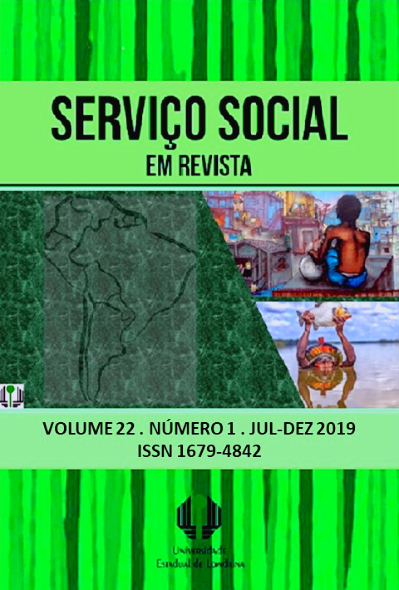The specificity of the Brazilian punitive wave
DOI:
https://doi.org/10.5433/1679-4842.2019v22n1p93Keywords:
Punitive wave, Neoliberalism, Brazil.Abstract
The integral policy of the State is not exhausted in the exercise of its repressive function. This policy will not be properly apprehended if it disregards the interdependence that its functions bear among themselves. In a dependent capitalist state, the difficulty of accumulating capital internally influences the structuring and behavior of classes, reflecting the patterns of political domination. One of its most characteristic features is the production of a large contingent of marginalized labor force, unmistakable with the reserve industrial army, and functioning as a strategy of social and political control. In the Brazilian context, it adds to the hierarchy that results from division into classes, the overlapping of that which derives from the color of the skin. The recent, partial and already surpassed social redemption carried out mainly through the increase of the consumption capacity - mistakenly recognized as a post-neoliberal period -, paradoxically, instead of acting in the opposite direction, has remarked a a constitutive feature of the Brazilian bureaucratic field, better understood as a long-lasting process: the Brazilian state never took its people with the reverence that even a limited liberal legal order advocates.Downloads
References
ANDRADE, V. R. P. A ilusão de segurança jurídica: do controle da violência à violência do controle penal. Porto Alegre: Livraria do Advogado, 1997.
AVELÃS NUNES, A. J. Neoliberalismo e direitos humanos. Rio de Janeiro: Renovar,2003.
BARATTA, A. Che cosa è la criminologia crítica. In: BECCARIA, C. Dei delitti e delle pene. Milano: Giuffré, 1991. v. 1, p. 53-81.
BARATTA, A. Criminologia crítica e crítica do direito penal: introdução à sociologia do Direito Penal. 2. ed. Rio de Janeiro: Freitas Bastos, 1999.
BATISTA, N. Mídia e sistema penal no capitalismo tardio. Revista Brasileira de Ciências Criminais, São Paulo, n. 42, p. 242-263, 2003.
BATISTA, N. Sobre el filo de la navaja. Revista EPOS, Rio de Janeiro, v. 2, n. 1, jan./jun. 2011.
BATISTA, V. M. Adesão subjetiva à barbárie. In: BATISTA, V. M. (org.). Loïc Wacquant e a questão penal no capitalismo neoliberal. Rio de Janeiro: Revan, 2012. p. 307-318.
BATISTA, V. M. Depois do grande encarceramento. In: BATISTA, V. M.; ABRAMOVAY, P. V. (org.). Depois do grande encarceramento. Rio de Janeiro: Revan, 2010. p. 29-38.
BOURDIEU, P. A distinção: crítica social do julgamento. 2. ed. Porto Alegre: Zouk, 2011.
BOURDIEU, P. Capital simbólico e classes sociais. Novos Estudos, São Paulo, n. 96, p. 105-115, 2013.
BOURDIEU, P. De la maison du roi à la raison d'État: un modèle de la genèse du champ bureaucratique. Actes de la Recherche en Sciences Sociales, Paris, v. 118, p. 55-68, 1997.
BOURDIEU, P. Esprits d'Etat: genèse et structure du champ bureaucratique. Actes de la Recherche en Sciences Sociales, Paris, v. 96, p. 49-62, 1993.
BOURDIEU, P. O senso prático. 3. ed. Petrópolis: Vozes, 2013.
BRAGA, R. A política do precariado: do populismo à hegemonia lulista. São Paulo: Boitempo, 2013.
BRASIL. Ministério da Justiça e Segurança Pública. Levantamento nacional de informações penitenciárias: INFOPEN atualização - junho de 2016. Brasília: Ministério da Justiça e Segurança Pública, 2017. Disponível em: http://www.justica.gov.br/noticias/ha-726-712-pessoas-presas-no-brasil/relatorio_2016_junho.pdf. Acesso em: 10 dez. 2017.
DE GIORGI, A. A miséria governada pelo sistema penal. Rio de Janeiro: Revan: ICC, 2006.
DUBAR, C. A crise das identidades: a interpretação de uma mutação. São Paulo: Editora da Universidade de São Paulo, 2009.
DÃœNKEL, F.; SNACKEN, S. Les prisons en Europe. Paris: L'Harmattan, 2005.
FOUCAULT, M. Em defesa da sociedade. São Paulo: Martins Fontes, 1999.
FOUCAULT, M. Microfísica do poder. 18. ed. São Paulo: Graal, 2003.
FOUCAULT, M. Omnes et singulatim: por uma crítica da razão política. Novos Estudos CEBRAP, São Paulo, n. 26, p. 77-99, mar. 1990.
GARLAND, D. A cultura do controle: crime e ordem social na sociedade contemporânea. Rio de Janeiro: Revan, 2008.
GARLAND, D. Punishment and welfare: a history of penal strategies. Aldershot: Gower, 1985.
KOERNER, A. Habeas-corpus, prática judicial e controle social no Brasil (1841-1920). São Paulo: IBCCRIM, 1999.
MARCUSE, H. A ideología da sociedade industrial: (o homem unidimensional). 4. ed. Rio de Janeiro: Zahar, 1973.
MELOSSI, D. A trent'anni da 'La questione criminale' nei 'rivoluzionari anni settanta. In: BANDINI, T.; BARATTA, A. Filosofia e sociologia del diritto penale. Torino: Giappichelli, 2006. p. 29-44.
MOURA, C. Brasil: as raízes do protesto negro. São Paulo: Global, 1983.
NEDER, G. Cultura jurídica, cultura religiosa e questão criminal. In: BATISTA, V. M.; ABRAMOVAY, P. V. (org.). Depois do grande encarceramento. Rio de Janeiro: Revan, 2010.
POLANYI, K. A grande transformação: as origens de nossa época. 2. ed. Rio de Janeiro: Campus, 2000.
RUSCHE, G. Labor market and penal sanction: thoughts on the sociology of criminal justice. Crime and Social Justice, San Francisco, v. 10, p. 2-8, 1978.
RUSCHE, G.; KIRCHHEIMER, O. Punição e estrutural social. 2. ed. Rio de Janeiro: Revan, 2004.
SALAS, D. La volonté de punir: essai sur le populisme pénal. Paris: Hachette Littératures, 2005.
SANTOS, J. C. O adolescente infrator e os direitos humanos. Discursos Sediciosos: crime, direito e sociedade, Rio de Janeiro, ano 5, v. 9-10, 2000.
SERRA, M. A. S. Economia política da pena. Rio de Janeiro: Revan, 2009.
SERRA, M. A. S. O subsistema penal de drogas no marco dos dez anos de sua vigência. In: CARVALHO, É. M; ÁVILA, G. N. (org.). 10 anos da lei de drogas: aspectos criminológicos, dogmáticos e político-criminais. Belo Horizonte: D'Plácido, 2016. p. 305-327.
SOUZA, J. Os batalhadores brasileiros: nova classe média ou nova classe trabalhadora? Belo Horizonte: Editora UFMG, 2010.
SOUZA, J. Ralé brasileira: quem é e como vive. Belo Horizonte: Editora UFMG, 2009.
SOZZO, M. Postneoliberalismo y penalidad en América del Sur. A modo de introducción. In: SOZZO, M. Postneoliberalismo y penalidad en América del Sur. Buenos Aires: CLACSO, 2016.
SPIERENBURG, P. The body and state. In: MORRIS, N.; ROTHMAN, D. J. (org.). The oxford history of prison: the practice of punishment in Western society. New York: Oxford University Press, 1998. p. 44-70.
WACQUANT, L. Classe, raça e hiperencarceramento na América revanchista. Discursos Sediciosos: crime, direito e sociedade. Rio de Janeiro, ano 17, n. 19-20, p. 231-250, 2012a.
WACQUANT, L. Forjando o Estado neoliberal: trabalho social, regime prisional e insegurança social. In: BATISTA, V. M. (org.). Loïc Wacquant e a questão penal no capitalismo neoliberal. Rio de Janeiro: Revan, 2012b. p. 11-42.
WACQUANT, L. Punir os pobres: a nova gestão da miséria nos Estados Unidos (A onda punitiva). 3. ed. Rio de Janeiro: Revan, 2007.
ZAFFARONI, E. R. La palabra de los muertos: conferencias de criminologia cautelar. Buenos Aires: Ediar, 2011.
Downloads
Published
How to Cite
Issue
Section
License
Copyright (c) 2019 Serviço Social em Revista

This work is licensed under a Creative Commons Attribution-NonCommercial-NoDerivatives 4.0 International License.
A revista se reserva o direito de efetuar, nos originais, alterações de ordem normativa, ortográfica e gramatical, com vistas a manter o padrão culto da língua e a credibilidade do veículo. Respeitará, no entanto, o estilo de escrever dos autores. Alterações, correções ou sugestões de ordem conceitual serão encaminhadas aos autores, quando necessário. Nesses casos, os artigos, depois de adequados, deverão ser submetidos a nova apreciação. As provas finais não serão encaminhadas aos autores. Os trabalhos publicados passam a ser propriedade da revista Serviço Social em Revista, ficando sua reimpressão total ou parcial sujeita a autorização expressa da revista. Em todas as citações posteriores, deverá ser consignada a fonte original de publicação, no caso a Serviço Social em Revista. As opiniões emitidas pelos autores dos artigos são de sua exclusiva responsabilidade.














